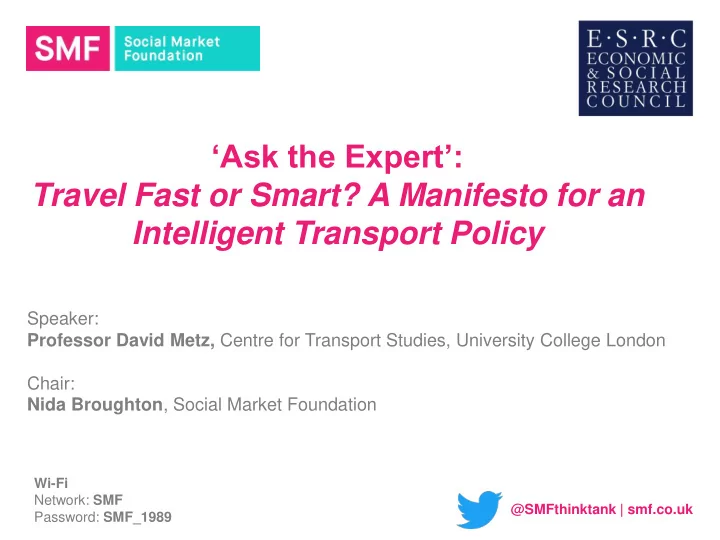

‘Ask the Expert’: Travel Fast or Smart? A Manifesto for an Intelligent Transport Policy Speaker: Professor David Metz, Centre for Transport Studies, University College London Chair: Nida Broughton , Social Market Foundation Wi-Fi Network: SMF @SMFthinktank | smf.co.uk Password: SMF_1989
Travel Fast or Smart? David Metz Centre for Transport Studies University College London
DfT Capital Expenditure £bn 14 12 10 8 6 4 2 0 2015-16 2016-17 2017-18 2018-19 2019-20 2020-21
Inconsistencies in transport policy • Closed under-used railways, but then demand doubled • Privatised railways, but took NetworkRail back • Gave up investment in motorways, but now plan major new construction • Vacillate on road pricing: London but not elsewhere • Buses privatised outside London, but now other cities allowed to adopt London model • Connectivity competes with Sustainability
National Travel Survey 800 700 600 500 400 trips/10 miles/10 300 time(hours) 200 100 0 1960 1970 1980 1990 2000 2010 2020
Economic benefits of Crossrail
High Speed 2
11
Problems with investment appraisal based on travel time savings • Infrastructure investments are long-lived • Time savings are short run • Disregards – Land use change and value enhancement – Spatial and socio-economic distribution of benefits • Biases – against urban rail – in favour of inter-urban road construction, in the vain hope of ‘ building our way out of congestion ’ – against digital technologies
Rethinking transport investment appraisal • Evidence based, not theory based - avoids double counting benefits • Recognise enhancement of land values • Develop Spatial Economics • Joint planning of transport investment by planners, developers and transport authorities • Determine monetary value of reliability to allow appraisal of investment in digital technologies
Average distance travelled by car (miles) 4500 4000 3500 3000 2500 2000 1500 1000 500 0 1975 1980 1985 1990 1995 2000 2005 2010 2015 2020 17
Why has per capita travel growth ceased? • Younger people less interested in cars • Demand saturation – enough daily travel to meet our needs • Technological constraints prevent faster travel • Urbanisation – less scope for car use • Changes in company car taxation (UK) 18
Road Traffic in London motor vehic cars 25,000 20,000 million vehic miles 15,000 10,000 5,000 0 1990 1995 2000 2005 2010 2015 2020
London share of trips 60 50 40 Rail per cent Bus 30 Car Walk 20 10 0 1990 1995 2000 2005 2010 2015
Share of journeys by car in London 1950- 2050 60 50 40 per cent 30 20 10 0 1940 1960 1980 2000 2020 2040 2060
Air travel: UK-USA and UK-Japan 2500 2000 Passenger numbers, thousands 1500 Japan USA/10 1000 500 0 1980 1985 1990 1995 2000 2005 2010 2015 2020
Heathrow expansion? • Future demand likely to be less, and more uncertain, than Airports Commission believed • 70% of passengers on leisure trips • Case for more capacity is about business travel • Plenty of room at Heathrow for more business travel if leisure travel displaced elsewhere • Very competitive aviation sector would meet market demand, utilising capacity at Stansted etc • If it were easy to agree on expanding Heathrow, worth doing, but if not, could manage without
Recommend
More recommend